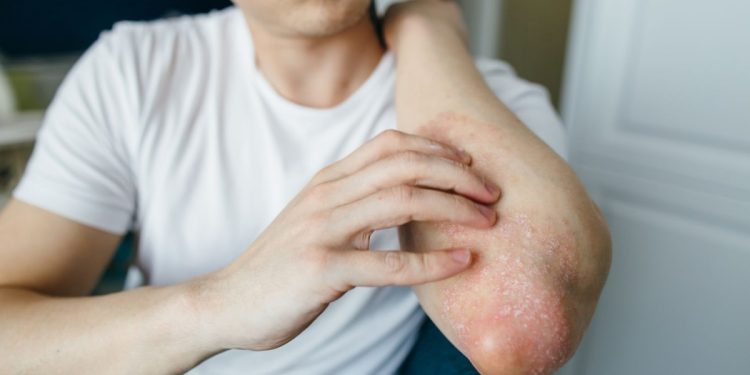Recognising the signs of psoriasis and understanding its various types and triggers is essential for effective management. While there is no definitive cure for this chronic condition, numerous treatment options are available to help control symptoms and improve skin health.
Psoriasis is a chronic skin condition characterised by itchy, scaly patches, typically appearing on areas like the elbows, knees, scalp, and trunk. This common autoimmune disorder can be painful, disrupt sleep, and affect concentration. Psoriasis often follows a cyclical pattern, with symptoms flaring up for a few weeks or months before temporarily improving. Individuals dealing with this condition should consider seeking expert advice from the best dermatologists in Bangaloreat Apollo Hospitals Bannerghattafor effective management and treatment options. Read on to learn more about the signs, causes, and available treatments for psoriasis.
Types of Psoriasis
Here are several types of psoriasis:
- Plaque Psoriasis: The most common form, affecting 80% to 90% of people with psoriasis. It causes raised, inflamed patches of skin with silvery-white scales.
- Pustular Psoriasis: Characterised by pus-filled bumps atop red, inflamed skin plaques.
- Inverse Psoriasis: This type appears in skin folds, leading to smooth, red lesions without scales.
- Guttate Psoriasis: Often triggered by a streptococcal throat infection, it presents as small, red, drop-like scaly spots, typically in children and young adults.
- Sebopsoriasis: A combination of psoriasis and seborrheic dermatitis, it presents as greasy, yellow scales on the face and scalp.
- Erythrodermic Psoriasis: A severe form affecting more than 90% of the skin, leading to widespread redness, shedding, and discomfort.
- Nail Psoriasis: Causes changes in the nails, including discolouration, pitting, and thickening.
Symptoms of Psoriasis
Common signs and symptoms of psoriasis include:
- Rashes that differ in colour, appearing purple with grey scales on darker skin, and pink or red with silver scales on paler skin
- A patchy rash that varies in appearance, ranging from dandruff-like scaling to widespread eruptions across the body
- Burning, itching, or soreness.
- Dry, cracked skin that may bleed
- Small, scaly spots, often seen in children
- Rashes that follow a cyclic pattern, flaring up for weeks or months before subsiding.
What Causes Psoriasis?
The exact cause of psoriasis remains unclear, but it is believed to be linked to a malfunction in the immune system. Typically, the immune system attacks harmful invaders like bacteria to protect the body. However, in psoriasis, the immune system mistakenly targets healthy skin cells, triggering inflammation that appears as plaques on the skin. Normally, it takes about 30 days for new skin cells to replace old ones, but in people with psoriasis, this process speeds up to just three to four days, leading to the rapid buildup of skin cells, causing scaling and frequent shedding on the plaques.
Psoriasis also has a genetic component, meaning it can be inherited from biological parents. Even so, many individuals with a genetic predisposition may not develop symptoms until they encounter certain environmental triggers. Some common triggers include:
- Cold, dry weather
- Infections like strep throat or skin infections
- Skin injuries such as scrapes, insect bites, cuts, or severe sunburn
- Heavy alcohol use
- Smoking or exposure to secondhand smoke
- Sudden discontinuation of oral or injected corticosteroids
- Certain medications, including blood pressure medications, lithium, and antimalarials
Psoriasis Treatment
There is currently no cure for psoriasis. It is a chronic condition characterised by fluctuating symptoms that may persist throughout life. The primary goal of treatment is to alleviate symptoms by slowing down the rapid growth of skin cells and reducing the formation of scales. The choice of treatment depends on the severity of the psoriasis and how well it has responded to past therapies and self-care practices. Patients often need to experiment with various medications or a combination of treatments to identify the most effective approach. Here are some commonly used treatment options:
1. Topical Treatments
They are available as ointments, oils, creams, lotions, foams, gels, sprays, and shampoos. Some of the most commonly prescribed topical treatments include:
- Corticosteroids like hydrocortisone, triamcinolone, and clobetasol
- Vitamin D analogues like calcipotriene and calcitriol
- Retinoids like Tazarotene
- Calcineurin inhibitors like tacrolimus and pimecrolimus
- Salicylic acid
- Coal tar
- Anthralin
2. Light Therapies
Light therapy is a primary treatment option for moderate to severe psoriasis, often used alone or alongside medications. This therapy involves exposing your skin to regulated doses of natural or artificial light. The most commonly prescribed types of light therapies include:
- Heliotherapy (natural sunlight exposure)
- UVB broadband light therapy
- UVB narrowband light therapy
- Psoralen plus ultraviolet A (PUVA) therapy
- Excimer laser therapy
3. Injected or Oral Medications
If you have moderate to severe psoriasis, or if other treatments have proven ineffective, your doctor may recommend systemic medications, which can be taken orally or administered through injection. These may include:
- Steroids, such as triamcinolone
- Retinoids, such as acitretin
- Biologics, such as etanercept, infliximab, adalimumab, ustekinumab, risankizumab-rzaa and ixekizumab
- Methotrexate
- Cyclosporine
- Thioguanine
- Hydroxyurea
Psoriasis is a chronic skin condition that affects many individuals, causing discomfort and a range of symptoms that can significantly impact quality of life. With various types and triggers, understanding the signs of psoriasis is crucial for effective management. Although there is no cure, there are numerous treatment options to alleviate symptoms and improve skin health. For those seeking expert care and personalised treatment plans, consulting with the best dermatologists in Bangalore at Apollo Hospitals Bannerghatta is highly recommended. Their expertise can guide you through the complexities of psoriasis, helping you find the most suitable strategies to manage this condition effectively.
Reference Links
https://www.mayoclinic.org/diseases-conditions/psoriasis/diagnosis-treatment/drc-20355845
https://my.clevelandclinic.org/health/diseases/6866-psoriasis
https://www.niams.nih.gov/health-topics/psoriasis
https://www.psoriasis.org/about-psoriasis









